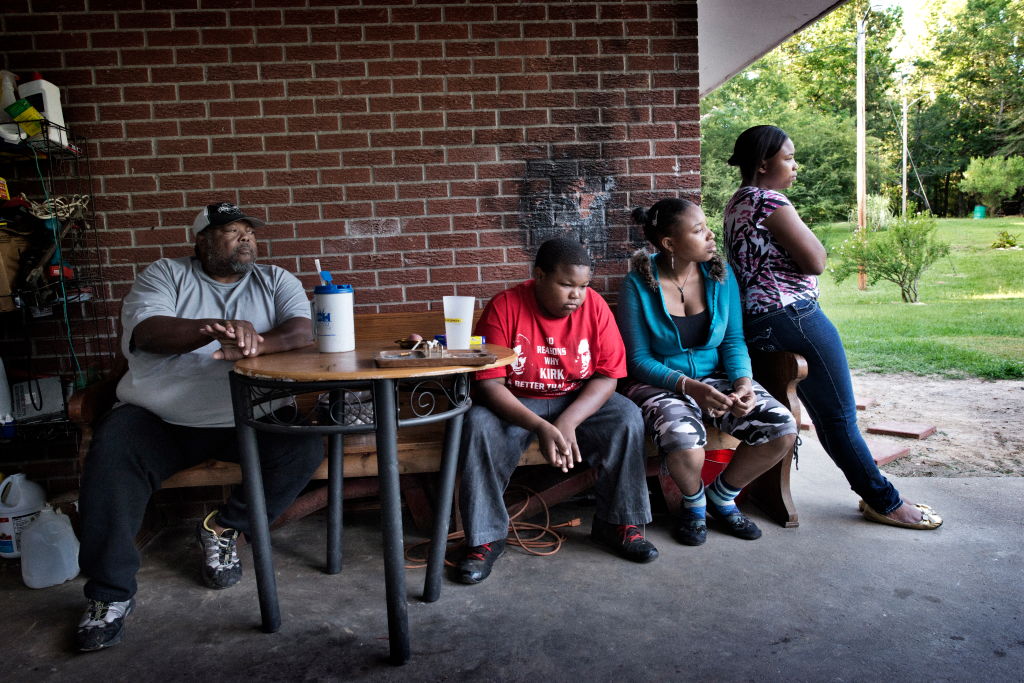Some gatekeepers come with more than two legs (Mario Tama/Getty)

The Mississippi GOP has near supermajorities in the statehouse and senate, controlling all eight statewide offices, both US Senate seats, and three of the state’s four Congressional seats. The last Democrat to carry the Magnolia State in a presidential race was Jimmy Carter. That was 1976.
But Ty Pinkins, a slim and energetic African-American lawyer, decided to challenge the GOP incumbent for a US Senate seat anyway. As the 50-year-old told me of his decision to take on Roger Wicker, “Don’t be afraid to walk in the tall grass. That’s how I started.”
Born to an unwed 15-year-old mother, Pinkins chopped cotton as a boy to help feed his family, a fate David Rushing, chair of the Sunflower County Democratic Party, says is typical of poor boys from the Mississippi Delta. “We don’t have many gutters in Mississippi,” explains Rushing, “but we have a lot of ditches.” For Pinkins, then, the tall grass was the only route out of that Delta ditch.
The first in his family to graduate high school, he struggled to pay for college. So, Pinkins left Mississippi for the tall grass of the US Army.
A 21-year military career gave him a passport full of stamps, three combat tours, a Bronze Star, and a job in the White House. After retirement, Pinkins earned not one but two law degrees from Georgetown University. He turned down the big money of a Washington law firm for the Delta.

Back in his hometown, Rolling Fork, Mississippi, Pinkins published a memoir, 23 Miles and Running, and litigated hundreds of civil cases for the underprivileged. In 2021, he made national news by filing a federal lawsuit on behalf of fired black farm labourers, who had been replaced by white South Africans. Filing suit and testifying before Congress on the issue, he forced a settlement.
Taking note was Mississippi’s lone Democratic Congressman, Bennie Thompson. The chair of the January 6 Select Committee tapped Pinkins to run for the local school board. By the time Pinkins learned of Thompson’s desire, he had already publicly declared his candidacy for the senate seat. “The biggest problems are federal issues,” he tells me. “That’s what I’m interested in. Our state is last in everything that is good and first in everything that is bad.”
In theory, Thompson and state Democratic chair Cheikh Taylor promised Pinkins, the only Democrat to announce for the race, their party’s full support. But though he knew the contest would be an uphill struggle, Pinkins never expected a major hurdle would be Bennie Thompson — his own Congressman and the very politician to first have noticed his talents.
At first, his phone calls asking for endorsements went unanswered. Then, when his phone did ring, respondents attacked, apparently upset that Pinkins’ hadn’t followed Thompson’s advice and run for his local school board. As Will Colom, a prominent black Mississippi attorney and party donor allegedly told him: “You will lose. You are a loser. And you will always be a loser.” A young Mississippi state representative also phoned. “Who the hell do you think you are, getting your name on the ballot?” they yelled. “You need to go through us gatekeepers.”
Gatekeeper. The term shocked Pinkins. Party insiders refused to support him simply because, as he tells me, “I didn’t ask anyone, ‘can I please run?’” The candidate’s astonishment went beyond personal ambition. With its pungent whiff of machine politics, what Pinkins calls Mississippi’s “Gatekeeper Syndrome” is the very problem “preventing our democracy at the state level from blossoming.”
Not that everyone is surprised. When I asked Ralph Eubanks about gatekeeping he laughed. As the academic and writer puts it: “Welcome to poor ole beat down Mississippi.” To Eubanks, Gatekeeper Syndrome reflects the “way the Democrats think about their own state. It is learned helplessness. There are so many things that are broken that can’t be fixed that many just give up.”

“Giving up” would oblige Democratic elites to abandon their prerogatives in favour of building a competitive party. So to safeguard their position, Bennie Thompson and his colleagues have adapted the strategy of that classic wheeler-dealer: Richard Daley. Just like Chicago, Eubanks tells me, Mississippi is a place where you “have to work your way up through the system or you are jumping the line.” He adds: “It’s not healthy at all because it stops someone who has talent and drive with an inspiring backstory. You’d think ‘let’s get behind the brother and help him out’ but that’s not happening.”
From the outside, Mississippi is ruby red. Outsiders assume that Democrats like Pinkins have zero chance. But with an African-American population of 40%, it’s the blackest state in the union. A reliable Democratic bloc, the African-American vote means Democrats can win with high black turnout and a quarter of white ballots. In 2023, Brandon Presley used that formula to come within 26,619 votes of the governor’s mansion.
White and black Mississippi Democrats can, and have, run competitive statewide races. But the problem isn’t at the top of the ballot. The issue, as Pinkins and others point out, are those gatekeepers, those machine politicians who think Mississippi’s Democratic Party belongs to them and them alone. No less important, gatekeeping means the bottom of the ballot stays empty.
In the same cycle as Presley’s 2023 near-miss, there were contests for all 122 of Mississippi’s statehouse seats. Yet in nearly half of contests, Democrats failed to field a candidate, a phenomenon that affects up-ticket races too. As Michele Hornish, the executive director of the Every State Blue campaign group explains, simply fielding a state representative candidate gives the top of the ticket a 1.5% vote boost. Running candidates across the ballot is also a barometer of a party’s grassroots health. As Scott Kleeb, a lead organiser with Rural Americans for Harris-Walz, admits: “For the last several decades Democrats have not been building at the local, county, and state level,” especially in rural states like Mississippi. Of the nation’s 3,143 counties, Kleeb says that Democrats have a chair in just 300.
To be fair, an increasing number of Democrats are prodding the system to change.
One example is Rickey Cole, a two-time Mississippi Democratic state chair and Pinkins’ campaign manager. Cole always intended to run a senate race while also re-building the state party’s grassroots.
Cole’s strategy was to organise Mississippi’s 82 counties and appoint a campaign leader in all 1,762 precincts. From there, Cole says, it’s “just math.” In 2020, after all, some 400,000 registered Mississippi Democrats failed to vote. This year, Cole needs to mobilise around 178,000. Once the party got organised, the path to higher Democratic turnout was easy. “In rural Mississippi,” Cole explains, “if you provide the matriarch of the family a list of folks who are sporadic voters, they can get to them.”

As Kleeb warns, moreover, this comprehensive approach is the only viable path to a Democratic revival in conservative redoubts like Mississippi. “Institutions matter,” he says. “We can’t go from candidate to candidate. Every campaign can’t build an airplane from scratch every four years.”
But instead of endorsements and campaign cash, all Pinkins got was a cold shoulder. Mississippi’s African-American leaders — notably Mike Espy — refused even to meet, much less endorse. Appeals to the Congressional Black Caucus, Black Economic Alliance, BlackPAC, Democratic Senatorial Campaign Committee, and Dirt Road Democrats all went unanswered too.
Behind it all was Pinkins’ former admirer: Bennie Thompson.
Mississippi’s lone Democratic Congressman is the political kingpin of the Delta, and the state’s black political establishment. Thompson earned national attention as chair of the January 6 Select Committee, but at home he squelches democracy as Mississippi’s lead gatekeeper. Pinkins tells me that “fear of Bennie Thompson” has resulted in only three of Mississippi’s African-American state senators and representatives endorsing him. Others supposedly tell him: “I can’t host a fundraiser for you because of Bennie Thompson.”
All the same, Pinkins persevered, and nearly two years on from his initial snub finally bagged a meeting with Thompson in May 2024. Much like their earlier interaction, Thompson was kind, heaping praise on Pinkins and promising his full support. “I commit to you,” he apparently said. “I will make a sizeable contribution to your campaign.”
Yet once again, Pinkins would soon find this apparent warmth vanish, like dew in the Delta sun.
Just days after their apparent reconciliation, the duo attended the Democratic State Convention. In an auditorium full of the state’s leading liberals, Pinkins awaited his promised endorsement. Instead, Thompson praised the white Brandon Presley as his “brother” and then promptly sat down. Audience members turned to Pinkins in astonishment. In July this year, at another Democratic gala, Thompson pulled the same stunt. Pinkins understood “that my own Congressman was clearly refusing to publicly support my candidacy.”
And in late August, at the Democratic National Convention, Bennie Thompson took his gatekeeping public. At a Mississippi state delegation breakfast, Thompson supposedly told 100-or-so party leaders that “we need to support our candidates but some of them need to earn it. He needs to work for the support. He doesn’t get to walk up to the head of the table and think he’s going to get our support.” The Congressman never mentioned Pinkins by name — but then again he didn’t need to.
Pinkins, for his part, has endured Thompson’s slights with grace, describing them as “the Congressman’s prerogative.” Not that he’s sat on his hands either, instead throwing himself into grassroots campaigning. Gradually, perhaps, Mississippians have understood he’s a different sort of candidate from the gatekeeper stereotype, not least in terms of race.
In the Deep South, most African-Americans run in majority-minority districts, developing little experience wooing white voters. Pinkins, by contrast, had spent two decades in the military, meeting civilians and leading soldiers from every walk of life. And like Georgia or North Carolina, Mississippi’s demography is changing. Mark Robinson, North Carolina’s scandal-plagued GOP nominee for governor, won his race for lieutenant governor on the backs of white votes. He may bring pizza to a porn shop, but he also reveals that white voters in 2024 are not what they were in 1965. He also shows that Southern whites are more open to voting for black candidates. For their part, Cole and Pinkins have eyed white Yankee transplants to Mississippi’s Memphis suburbs, as well as snowbirds, soldiers, and shipbuilders in towns like Pascagoula. In soliciting white votes, alongside the African-American base, Pinkins says he’s learnt that most voters crave the same thing. “They want someone they can trust,” he says. “They are so tired of politicians doing the same old things. We end that by meeting voters face-to-face.” Pinkins adds that Mississippians of all races are interested in a Delta boy like him “doing something unorthodox.”

More than that, meanwhile, Pinkins feels a moral obligation to take on people like Bennie Thompson. “Walking in the tall grass,” he says, “is doing what the average Mississippian can’t afford to do,People want politicians to have moral courage. They wonder: ‘Do you have the courage to the hard right or the easy wrong?’”
By going public about Thompson’s behaviour, Pinkins believes he is doing that hard right. Perhaps. But there’s still a way to go until the gatekeepers are vanquished. As Pinkins explains, one issue are those black Mississippian Democrats still unwilling to cause civil rights legend John Lewis called “good trouble”.
“There are a select few black men who, because of Gatekeeper Syndrome, are stopping progress in Mississippi at the federal and state level,” he says, after a heavy sigh. “Their reluctance to go against Bennie Thompson is holding back black Mississippians. We have a lot of officeholders who prioritise their personal power over the people’s interest.
At this point, Pinkins stops and exhales, before starting again. “We need to have the conversation. Sunlight is the best disinfectant.”
All the while, Cole and Pinkins believe their efforts will boost Democratic changes in a 2026 senate race against a weak GOP incumbent. They’re also looking ahead to Brandon Presley’s widely anticipated 2027 race for governor. But those efforts will be undone if Mississippi’s gatekeepers shoo talented candidates like Ty Pinkins from the ballot.
As for the former cotton chopper, David Rushing is clear. “He has my unequivocal support. He’s the real deal. He is not blowing smoke. I just admire him. He’s a bright star, and the future of the party if he doesn’t get frustrated by all this mess.”
But the tall grass is where Pinkins feels most comfortable. Like his own life, he sees it as the only way for Mississippi to move forward.










Join the discussion
Join like minded readers that support our journalism by becoming a paid subscriber
To join the discussion in the comments, become a paid subscriber.
Join like minded readers that support our journalism, read unlimited articles and enjoy other subscriber-only benefits.
Subscribe